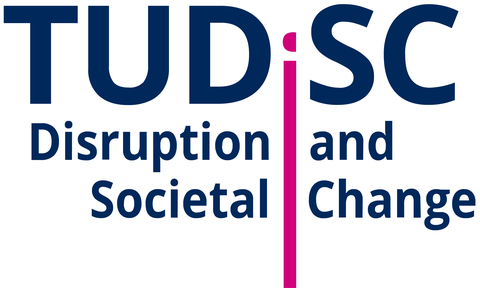Oct 24, 2022
Agency, Disruption, Transformation and Smartness: Follow-up Report on the Second TUDiSC Conference
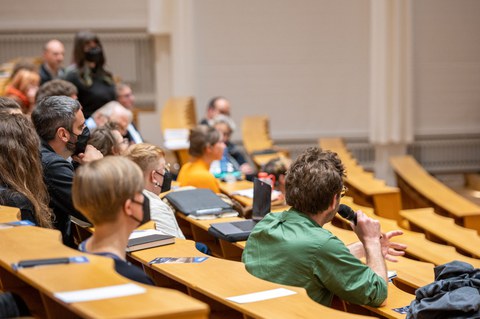
Members of TUDiSC at the discussion following Orit Halpern's University-Wide Inaugural Lecture in the Heinz Schönfeld Lecture Hall.
The Disruption and Societal Change Center der TU Dresden (TUDiSC) had invited to its second conference from October 12-14, 2022. The conference was themed "Systems of Agency in Face of Disruption" and was organized by four of the TUDiSC projects: Disruption on the Internet: More Sovereignty toward Deceptive Technologies (DESIGNATE), Many Moving Parts: Continuity, Disruption, and Change in Global Humanitarian Aid Relations (HUMGLOBAL), The Disruptivity of the Others in Urban Transformations (DOUbT), and Transformative Place-Making for Uncertain Futures: Narratives, Education, and Design (TPM).
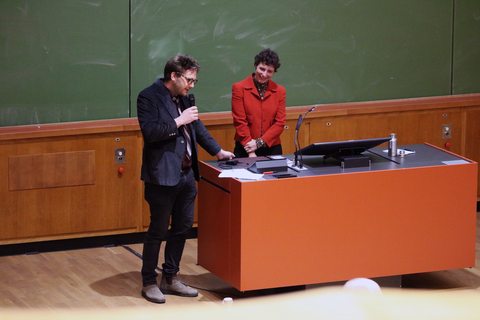
Julia Wittmayer was introduced by Moritz Ingwersen, principle investigator at TPM and co-organizer of the conference.
The conference kicked off Wednesday evening in the Heinz-Schönfeld Lecture Hall with a public keynote on "Disruption and Agency from a Sustainability Transition Perspective" by Julia Wittmayer (The Dutch Research Institute For Transitions, DRIFT Rotterdam). The anthropologist and PhD in social sciences gave an insight into her work on sustainability transformation and at the same time encouraged to reflect on the role of science and scientists in the context of these transformation processes. Afterwards, participants had the opportunity for exchange over snacks and drinks in the foyer.
The discussion with Julia Wittmayer was deepened on Thursday morning at a "working breakfast" in the Neustadt, before the conference continued at noon with a welcome from TUDiSC-chairperson Christian Prunitsch in the Klemperer Hall of the SLUB. Afterwards, the four organizing projects presented their work and their current state of research, with a special focus on young researchers. With a view to the following day, they also presented project-specific questions that they planned to discuss with their TUDiSC-colleagues the next day.
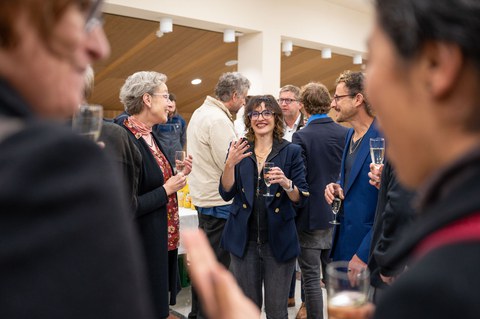
Orit Halpern (center) in conversation with TU Dresden Rector Ursula M. Staudinger and her brother Tal Halpern during the champagne reception following her inaugural lecture.
To conclude Thursday, TUDiSC members were invited to attend Orit Halpern's University-Wide Inaugural Lecture in the Heinz-Schönfeld Lecture Hall. The holder of the newly established professorship in Digital Cultures is also the spokesperson for the TUDiSC Conceptual Group. That evening she presented her research in the lecture "The Smartness Mandate. Re-imagining our Technological Future." The event was also streamed live and is now available as a YouTube video. At the champagne reception that followed, attendants again had the opportunity to exchange ideas with each other and with Orit Halpern and her team.
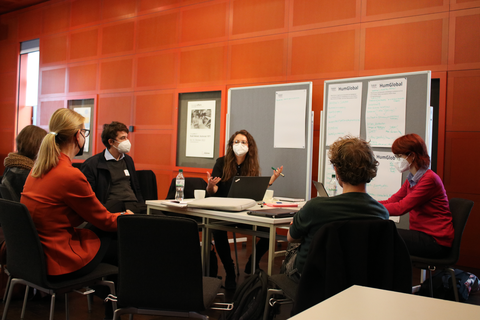
Patricia Ward (center) in a World Café session on her project HumGlobal.
The last day of the conference started at 8:30 a.m. at the SLUB with coffee followed by three world café sessions. For this, each of the organizing projects had prepared two to three questions, which were discussed in changing groups consisting of all TUDiSC members. The interdisciplinary composition of the groups provided the (young) scientists with new perspectives on their research topics and also gave the project members who were not involved with organizing the conference the opportunity to look at disruption from new angles. As a result of the joint discussions, it was possible to work out that disruptions play a role in the disclosure of critical infrastructure which only comes to light through its vulnerability. Resilience and the ability to react to disruptions and innovations form an important part of sustainable transformations. The importance of agents and their agency and how non-action can be integrated as part of agency can be described in Constellations of Agency after the conference.
After presenting and discussing these results, Christian Prunitsch concluded by soliciting feedback from the participants on the conference and gave outlooks on upcoming topics, for example the third TUDiSC conference planned for March 2023.
Further information on the Disruption and Societal Change Center can be found here www.tu-dresden/exzellenz/tudisc.
The EXU measure "Disruption and Societal Change" at TU Dresden (TUDiSC) is funded by the German Federal Ministry of Education and Research (BMBF) and the Free State of Saxony within the framework of the Excellence Strategy of the German federal and state governments.

